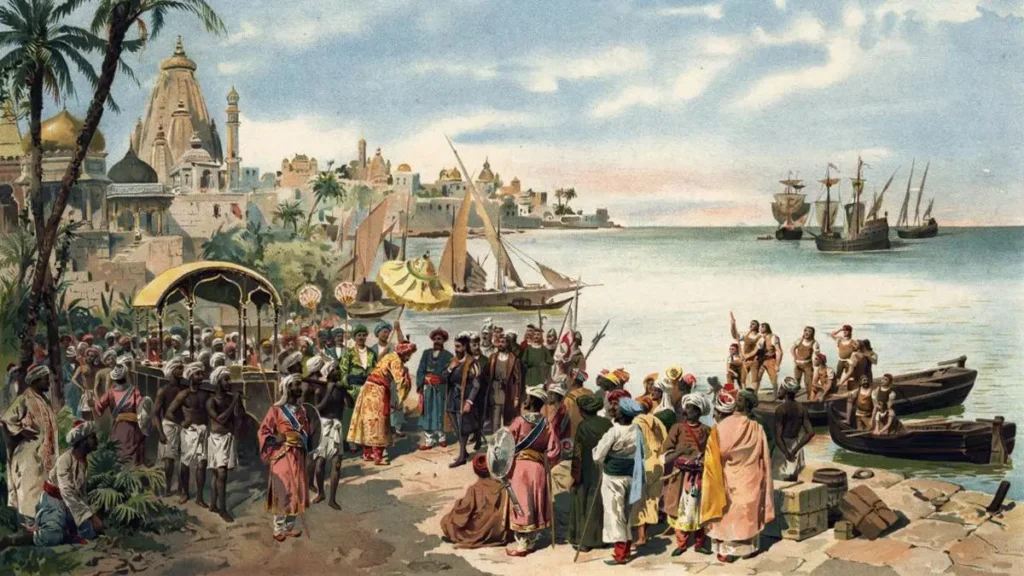
The arrival of Vasco da Gama at Calicut by Roque Gameiro (1900).
| Photo Credit: Wikimedia Commons
The rise and fall of empires is akin to a human life wherein birth, decay, and death are all coded in the DNA. The veteran diplomat Ambassador Alan Pascal Nazareth subtly draws out this truth in his book, a compendium of lectures delivered on the high seas during his various lecture cruises. The book draws from his prodigious scholarship, spanning history, civilisations, and cultures across continents.
History is witness to the recurring follies of great leaders in their bid for supremacy, says Nazareth. Since the destiny of empires is shaped by personalities, analysing their follies is critical for understanding their decline. There appears to be a method to the madness of their recurring follies: ambitious expansion beyond resources, misjudgment of circumstances, underestimating their adversaries’ capacity for repulsive attacks, and rising nationalism in the conquered territories.
Historical Perspectives: Illuminating Minds on Blue Waters
By Pascal Alan Nazareth
Konark Publishers
Pages: 336
Price: Rs.800
Nazareth elaborates on the unfolding tragedy of the Greek Empire from its pinnacle under Alexander the Great in 323 BCE; the devastating Peloponnesian Wars between Athens and Sparta under the Persians; the prolonged occupation under the Romans and the Ottomans; and the formation of the Third Hellenic Republic under a new constitution in 1974.
Competitive colonialism
If Greece is where the West looked for democracy, philosophy, literature, and art, Rome was the fountainhead of law and good governance. The Roman Empire, too, collapsed under the weight of its own ambitious expansion.
Also Read | Islamic inquiry
The recordings of the 13th century explorer Marco Polo about India ignited great curiosity and impelled the European monarchies to support historic voyages. Vasco da Gama’s discovery of a trade route to India via the Cape of Good Hope in 1498 triggered a phase of competitive colonialism that resulted in their mutual destruction in the great wars of the 20th century. The Spanish and Austrian empires made significant contributions to the realm of religion, music, art, literature, and paintings that continue to captivate and inspire people around the world.
The book also covers objectively the evolution of Islam from the divine revelations of its founder, Prophet Muhammed, to the later rise of fundamentalist interpretations. The Ottoman Empire presented an age of opulence and religious tolerance in the Middle Ages, but its ruthless capture of territories in Europe, Asia, and Africa rebounded as fear and hostility towards Muslims in Europe. This persisting inimical sentiment proved to be its nemesis and created a Christian counterpart to Islam’s jihad: the Crusades. The author warns that the incessant aggression against Palestinians and attempts to universalise Western values and institutions in the region have created deep resentment amongst Muslims, and that the ongoing conflicts in Gaza have the potential for attacks like 9/11 to be repeated.
Historical Perspectives: Illuminating minds on Blue Waters
| Photo Credit:
BY SPECIAL ARRANGEMENT
The Meiji Restoration under Emperor Mutsuhito in the 19th century led to the modernisation of Japan along Western lines but was also responsible for awakening the beast within. Although late to the game of colonialism, Japan’s swift victories in the Russo-Japanese War in 1905 and its subjugation of China emboldened it to pursue an assertive territorial conquest. Japan’s transformation to a pacifist nation, post the Second World War, renouncing destructive wars and seeking peace was a pragmatic decision made with foresight.
Military genius and outstanding leader though he was, Napoleon also succumbed to narcissistic empire-building ambition. His fall illustrates that all military victories are evanescent and every great empire will ultimately collapse and disappear. It reminds us of the philosopher George Santayana’s famous quote: “Those who cannot remember the past are condemned to repeat it.” However, it is Nazareth’s reasoned observationthat empires built not by force but by the power of the spirit are the ones that have endured for a long time. This conviction resonates in Napoleon’s admission a few weeks before his death on St Helena: “There are only two powers in the world—the Sword and the Spirit. In the long run, the Sword will always be conquered by the Spirit.”
Lasting impact of India’s spirituality
Nazareth believes that perhaps it is India’s spirituality that had a lasting religious and cultural impact on countries in South Asia. It is a process of subtle subversion without the system realising it. In the words of the French Indologist Sylvain Lévi: “Mother of Wisdom, India gave her mythology to her neighbours who went on to teach it to the whole world.” Another French scholar, George Coedes, said: “The countries conquered militarily by China had to adopt or copy her institutions, her customs, her religions, her language, and her writing. By contrast, those which India conquered peacefully preserved the essentials of their individual cultures and developed them….”
Also Read | Mahatma Gandhi: Life, legacy, and relevance in modern India
The author underscores Gandhi’s spirituality as truly reflecting India’s civilisational ethos, relevant for all times. He reveres Gandhi for his steadfast pursuit of truth and non-violence. As the philosopher Will Durant aptly observed: “…India gave to the world the unprecedented phenomenon of a revolution led by a saint and waged without a gun.”
This scholarly book goes beyond a mere recollection of historical facts. It is a study of causes, consequences, and contexts of events that shaped our world and the valuable lessons they hold for humanity.
Dammu Ravi is a serving foreign service officer.
Source:https://frontline.thehindu.com/books/rise-fall-empires-lessons-historical-perspectives-review/article69600724.ece

